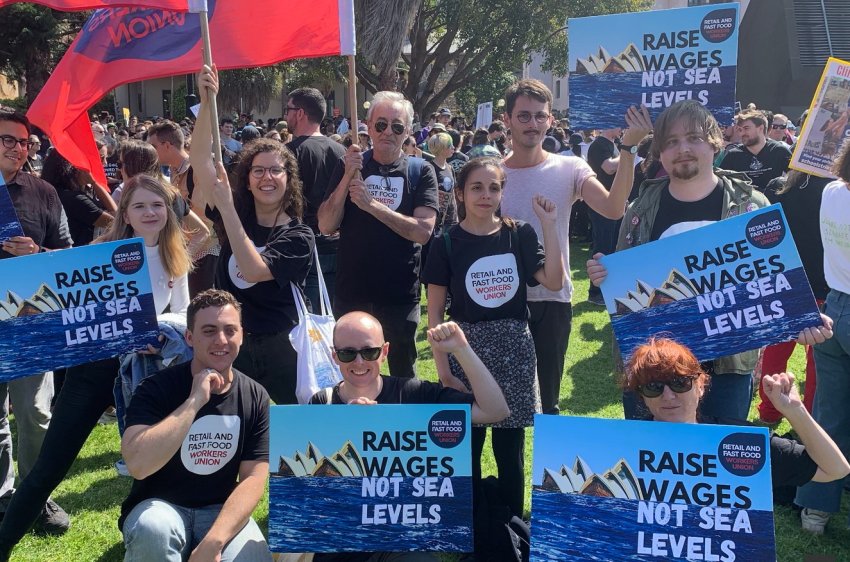
The federal government’s “omnibus bill” was always about big business and billions of dollars. That is no surprise.
The real surprise was, in the middle of a global pandemic, union leaders’ desire to chew the fat with big business and a worker-hating government.
It takes a certain wilful blindness to believe that entertaining a lunch with Attorney-General and Minister for Workplace Relations Christian Porter and Australia’s biggest exploiters of labour could result in some form of compromise — when there was no powder in the keg. The “confidentiality agreements” required to participate in the boss’s discussions were held more dear by unionists than by big business.
The Retail and Fast Food Workers Union (RAFFWU) criticised the “discussions” last April and demanded an action plan from Australian Council of Trade Unions (ACTU). Nine months were lost and now the law entrenches insecure work.
However, of higher value for the ACTU was to regain some relevance after the failed Change the Rules campaign and to pursue the Shop, Distributive and Allied Employees Association (SDA) dream to restore its business model with big business, weaken the better-off overall test (BOOT) and sideline RAFFWU.
Last year, big business criticised the full Federal Court’s decision in WorkPac v Rossato that found rolled up casual loadings paid by an employer cannot be offset against annual leave, personal leave and redundancy payments stolen from a worker who is not employed on a casual basis at law.
Casual employment
The Federal Court of Australia dealt with the same issues more than a decade earlier in 2010 in Williams v MacMahon Mining Services, giving every single exploiter of insecure labour notice of the debt owed to workers who are not indeed employed on a casual basis.
The scandal is that successive Australian governments and regulators have done nothing to return the billions of dollars stolen from millions of low-paid workers over the past 12 years.
The exploiters of insecure labour have deliberately chosen not to pay workers their entitlements. It is a scandal of epic proportions. You may not have heard of it because the precariously employed do not have a voice. Now class actions are being brought by law firms against the exploiters of labour. Big business is under the gun for billions of dollars of wage theft.
The changes that passed the Senate on March 18 will determine a definition for casual employment which is not connected to reality. It will say a cat is a dog, because the employer says it is.
Critically, the changes mean that any minimum wage loading can be used to offset entitlements which should be paid to workers who are not really employed on a casual basis. The law steals billions of dollars from millions of low-wage workers.
That is not a win, as the ACTU described it, it is a catastrophic loss.
The lens through which the aristocracy of the labour movement views such campaigns subjugates workers employed on a casual or precarious basis.
Casual employment is premised on an insecurity which tears at the fabric of the individual, the collective and society. Casual employment should be prohibited. This would vastly improve the working lives of millions of workers. A securely-employed workforce would be the fastest mechanism to drive higher wages, safer workplaces and a healthy society.
It is uncontroversial that the insecurely employed have felt the worst impact of the COVID-19 pandemic. They have lost their jobs, income and any employment security they had. They have been forced, and coerced, into working throughout a global pandemic which put them, their families and their colleagues at risk.
Workers in retail and fast food could not shelter at home, at the beach house or on the yacht. Their employment insecurity means that they live pay cheque to pay cheque. To feed their children and put a roof over their heads they were compelled to work.
Even the JobKeeper arrangements were punitively targeted against workers in casual employment — who had to prove 12 months of continuous service.
These workers need to be rewarded by eliminating insecure employment. The new Fair Work Amendment (Supporting Australia’s Jobs and Economic Recovery) Bill 2020 punitively targets the vulnerable who have suffered the most under the pandemic.
Casual employment should be prohibited. This exploitative form of employment is used by employers to deny workers dignity at work and fairness in conditions. There is no place for systemic, regularised, casual employment in a modern democracy.
Precarious employment
The past year showed that the monied classes will exploit workers in precarious employment — whether they were security guards in hotels while the jet-setting rich and famous bemoan quarantine, fast-food workers serving fries without masks, sanitiser or gloves, or retail workers over whom panic buyers climb and cough.
Not a second’s thought was given to demanding they continue to work no matter the risk it posed to them and their families. Paid less than a living wage, these workers were suddenly “essential”.
Simultaneously, workers in precarious jobs which were shuttered or shut were thrown to the scrap heap. Those without social security entitlements were literally left to starve.
Relying on the courts or parliament has been shown to be the farce it is. Unless the monied and their political classes are threatened, they will not consider the needs of the precariously employed.
This is why, last year, it was so important to mobilise and build a fighting response to the attacks on workers we knew were coming. Instead, labour’s aristocracy dined with Porter.
Some say this was always going to be the case. That is probably true while the precariously employed are not enrolled in unions or organising and leading unions.
Organising workers in casual and precarious work is the most difficult, exhausting, demanding, horrible and life-giving work any unionist could ever hope to do.
Ignoring workers employed in casual and precarious work is simply not organising. There is no value in achieving 26 weeks of paid parental leave throughout a sector if the vast majority of workers are not entitled to any paid leave. Such antics entrench exploitation as employers move to extract benefit from an insecure sub-class.
Rights for the precariously employed
My debates with the ACTU go back long before I helped workers take on the ACTU’s largest financier in the SDA. Almost all of them involved the rights of casual and other precariously employed workers.
Over the past four decades, many times the ACTU has not grasped opportunities to mobilise. That is not to say nothing has been done for workers in casual employment.
Some workers employed on a casual basis have gained some rights against unfair dismissals. Some have rights, rarely honoured, to consult over roster and contract changes. Some have rights to request conversion to non-casual employment. A woefully inadequate casual loading is paid to some. Town Hall meetings have been held and reports written.
All of this is charity for well-meaning unionists. None of it is much value to the vast majority of precariously employed workers. None of it was won through the mobilised collective action of masses of workers.
That is where the fight lies: resourcing precariously employed workers to become organised, to gain a voice and to demand change. This means changing the way unions organise.
Having been responsible for campaigns organising precariously employed workers for more than 20 years, I know this will not come from the charity of the old guard (even the well meaning) in the traditional labour movement. That is because the disparity between the haves and the have-nots is far too wide.
Union staff ranks are populated by people who have never had to worry about their children being fed, or the electricity being cut off, or sending nude photos to a boss to get their next shift. Some workers with these experiences are employed by unions — but they are not being heard.
But that is not how union organising works: it requires commitment, leadership, resources and time which, too often, are used by gutter aspirants (usually older, whiter and male) against those who mean well.
The labour movement needs to radically reorganise to put the leaders of those who work in precarious employment at the forefront.
Some unions will never do this. Instead, they prey on the precariously employed and their industrial arrangements or political affiliations expose just how diabolical that can be.
The SDA has four times the influence within the Labor Party if a single full-time job is smashed down into four jobs of nine hours each. This is why, for more than a decade, the SDA maintained Domino’s Pizza agreements in which delivery drivers were not paid any casual loading or penalty rates — at all — among other cuts to conditions.
Other unions need leadership to take the radical steps. That will not come from the ACTU which is so removed from worker reality it cannot understand how casual employment destroys an individual and the fabric of society. If a leading unionist declares there is a place for some proportion of casual employment in any workplace they are lost to the cause.
However, there are groupings of radical activists in precarious employment starting campaigns for change. Some are supported by great unions with proud histories. We must give those activists the space to learn, organise and fight. Their struggle is the hardest of all.
In the meantime, casual employment will remain entrenched in many sectors.
The role played by the aristocracy of labour is now more clearly understood. The ACTU’s email on March 18 claiming to have “successfully prevented the worst elements of the Morrison Government’s ‘Omnibus Bill’” alienated swathes of workers.
There is no alternative now. It is all workers to the fight. That involves radical collective action which can transform the lives of those involved, transform society and transform our labour movement.
That new generation of precariously employed workers must be given voice and encouraged to take on leadership roles in unions. They ought to organise in whatever way will achieve their aims. We must encourage, enable and amplify their voice. We must call out discrimination against the precariously employed which makes organising harder.
It is time we started collating and telling the stories of collective action by precarious workers — especially written by those workers themselves.
The task is monumental, and it always has been. But organising militant action is the only way to secure job security. That starts with building a community of precariously employed workers who cannot just challenge their employer.
That community provides the space to create ideas, develop campaigns, build solidarity and prepare action. We must stand with members and resource their campaigns. All of us must be prepared to exercise genuine solidarity when those campaigns lead to employer retaliation. This is where we will find Joe Hill.
[Josh Cullinan is the Secretary of the Retail and Fast Food Workers Union.]
